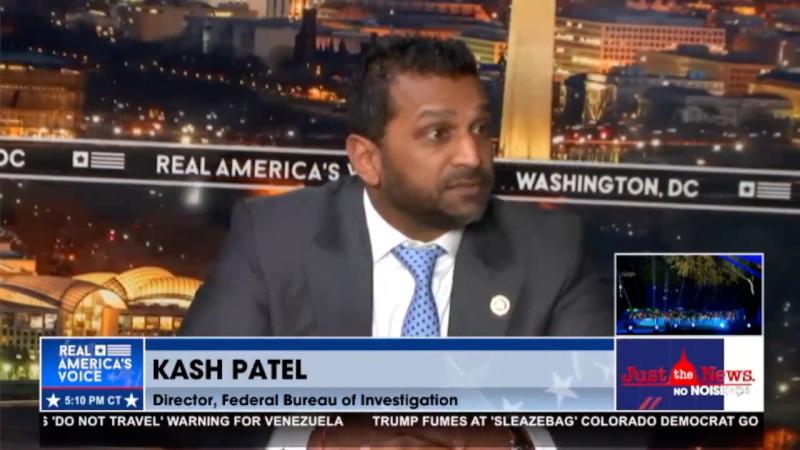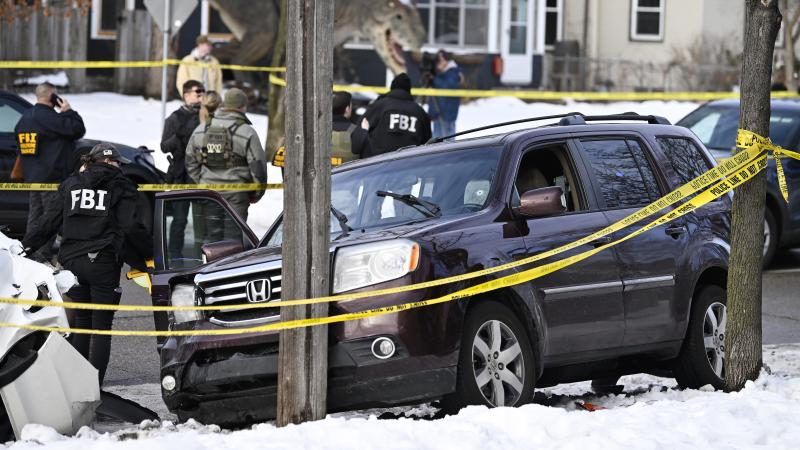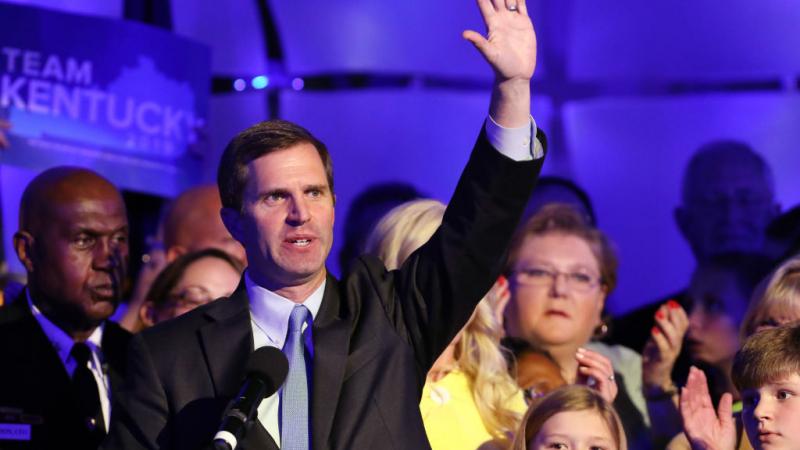New transparency task force could pursue declassification on these incidents shrouded in secrecy
From the JFK assassination to Russia collusion and the 9/11 files to Jeffrey Epstein, here are several batches of documents the new House Oversight transparency task force could pursue.
The House Oversight Committee on Tuesday announced new members of the transparency task force, which aims to ensure the public release of information related to closely guarded episodes in American history, like the political assassinations that rocked the nation in the 1960s.
The new panel opens up the door to pursue sets of data for declassification that could shed light on some of the most controversial and impactful incidents during the Trump and Biden administrations, ranging from the Trump-Russia collusion probe to the chaotic Afghanistan withdrawal.
“[What] all of this is about is about transparency and accountability,” Rep. Brandon Gill, R-Texas, a member of the new task force, told the "John Solomon Reports" podcast on Tuesday.
“You hear people, particularly on the left, talk about how, you know, Republicans are undermining faith in our institutions. And I think that, you know, the response is, do these institutions deserve to have faith put in them? And I think that what we want to do is restore real accountability and real faith back into our federal government,” he said.
Gill concluded, “A good way to do that is to allow the American people to see things that they've been wondering about and have legitimate concerns over.”
House Oversight Chairman James Comer formed the Declassification and Transparency Task Force to “build on” President Donald Trump’s executive order directing the declassification of files related to the assassinations of President John F. Kennedy, his brother Robert F. Kennedy, and civil rights leader Martin Luther King.
“For too long, the federal government has kept information of public interest classified and the American people are demanding greater transparency. This secrecy has sowed distrust in our institutions,” Comer said in a statement announcing the formation of the task force.
Comer tapped Rep. Anna Paulina Luna, R-Fla., to lead the panel. She promised the task force would “also investigate UAPs/USOs, the Epstein client list, COVID-19 origins, and the 9/11 files.”
“The federal government has been hiding information from Americans for decades. We have spent years seeking information on the assassinations of President Kennedy, Senator Kennedy, Reverend King, and other government secrets without success. It is time to give Americans the answers they deserve, which is why I am honored to lead this bipartisan task force that seeks truth and transparency, Luna said in a statement.
She vowed, “From this moment forward, we will restore trust through transparency.”
In addition to the assassination documents, here are several episodes still shrouded in secrecy that the task force could pursue:
Russia investigation documents
Despite a few key declassifications, many key documents surrounding the now-discredited Russia collusion probe into the Trump campaign and presidency remain secret, even after the president promised during his first term that he would declassify all documents relevant to the investigation after the special counsel probe ended.
As Trump’s first term was ending, Just the News compiled a list of 40 important batches of documents that remained secret. These included the documents showing requests by Obama administration officials to unmask overseas phone calls of the Trump campaign, transition, and family members; documents related to the FBI’s dealings with dossier source Christopher Steele; and details surrounding the probe into former Trump national security adviser Michael Flynn.
Information about Trump assassination suspects
Since the two separate assassination attempts against then-GOP presidential candidate Donald Trump last year, little new information about either of the two suspects has been presented to the public by investigators. Earlier this month, President Trump directed the Secret Service to provide him “every bit of information” about both suspects, Thomas Crooks and Ryan Routh.
Crooks attempted to assassinate Trump at a July 2024 rally in Butler, Pennsylvania. After climbing onto the roof of a nearby building, the 20-year-old opened fire on the rally with a rifle, injuring Trump and two others and killing one rally-goer. Crooks was shot and killed by law enforcement snipers. Shortly after the shooting, the FBI told Congress that it discovered three encrypted communications apps and a photo of a school shooter on Crooks’ cell phone as well as bomb-making materials inside his vehicle.
Details about Routh, the second suspected assassin, also raised more questions than answers after his arrest. Routh had an extensive criminal record dating to his time spent in his hometown of Greensboro, North Carolina, where he was charged with several crimes, including felony possession of a weapon of mass destruction—a machine gun—according to court records.
Later on, Routh became an advocate for Ukraine in its war with Russia, even traveling to the country in order to volunteer to fight. After being rejected by the foreign legion because of his age and lack of experience, he went about trying to recruit foreign fighters.
Epstein investigation
During the campaign last year, Trump hinted that he would seek to release the infamous client list of financier and major Democratic Party donor Jeffrey Epstein, who had been charged with sex trafficking of minors and conspiracy to do the same. He was later found dead in a holding cell in an apparent suicide. The failures that led to Epstein’s death before he was able to stand trial, including a failure to properly monitor the cell and malfunctioning security cameras, have caused doubt to swirl around the incident.
Complete after-action report on Biden’s Afghanistan withdrawal
In the wake of the shambolic final withdrawal of U.S. troops after a decades-long war in Afghanistan, the Pentagon compiled an after action review addressing the failures, but much of the documents used to assess the incident remain secret.
The Biden Pentagon originally released an unclassified version of the "After Action Report on Afghanistan" in June 2023 after members of Congress urged the administration to release any information contained in the review that was not classified. But, the “After-Action Review files” which were used to assemble the report, remain secret. According to the House Foreign Affairs Committee, the AAR files are “an electronic and paper collection of all the materials the review team consulted and cited to prepare its report.”
Assessments of COVID-19 origins
Rep. Luna said that her new panel would target for declassification assessments about the origins of the COVID-19 pandemic, which have been the subject of changing intelligence community assessments. Earlier this year, the Central Intelligence Agency backtracked on its assessment of the pandemic origins, concluding that the virus likely originated from a laboratory leak, mirroring prior conclusions drawn by both the FBI and Department of Energy.
Senior public health officials came under scrutiny from House Republicans over efforts to discredit so-called lab leak theories at the beginning of the pandemic. The House Oversight Committee in 2023 argued that then-National Institutes of Health Director Francis Collin and then-director of the National Institute of Allergy and Infectious Disease Anthony Fauci sought to suppress the theory to support instead a “preferred, coordinated narrative.” Democrats and mainstream media insisted for years that the "lab leak" was a "right-wing conspiracy."
Files from the 9/11 investigations
Despite pressure from families of victims and Congress, a vast majority of documents related to the 9/11 Commission remain classified for national security reasons. Among the most sought after products for public transparency are any documents related to Saudi Arabia’s role in the attacks, allegedly memorialized in an 11-page report.
According to the National Archives, after the 9/11 Commission concluded its investigation in August 2004, it transferred “approximately 570 cubic feet” of “textual records” to the agency, many of which remain secret because they purportedly contain national security classified information.
President Biden during the 2020 campaign promised to declassify documents related to Saudi Arabia’s alleged role in the attack, but did not release any during his term in office.
In September 2023, Sens. Richard Blumenthal, D-Conn., and Ron Johnson, R-Wis., sent a letter to then-Attorney General Merrick Garland and FBI Director Christopher Wray asking them to furnish “complete, unredacted records of Saudi Arabia’s role,” and castigating the agencies for failing to respond to their requests.
“Your failure to respond to our letter only adds to our concerns about the U.S. government’s long-standing refusal to provide full transparency to the American public, and particularly for the families of 9/11 victims, about Saudi Arabia’s role in the 9/11 attacks,” they wrote.
The Facts Inside Our Reporter's Notebook
Links
- announced new members
- new panel opens up the door
- John Solomon Reports
- Declassification and Transparency Task Force
- said in a statement
- said in a statement
- 40 important batches of documents
- every bit of information
- discovered three encrypted communications apps
- raised more questions than answers
- charged with sex trafficking of minors
- shambolic final withdrawal
- released an unclassified version
- the AAR files are
- came under scrutiny
- right-wing conspiracy
- remain secret
- asking them to furnish















